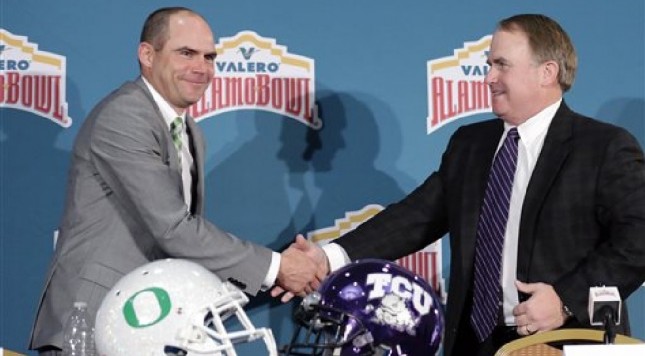Mark Helfrich is not a bad coach because his Oregon Ducks blew a 31-0 halftime lead to the TCU Horned Frogs in this past Saturday’s Alamo Bowl.
Helfrich isn’t a bad coach, period. He helped rescue Oregon’s season, which appeared to be headed off a cliff at one point but became (in its regular-season incarnation) a 9-3 journey with a road win at Stanford and a home-field shellacking of USC. The Ducks defeated the two division champions in this season’s Pac-12. Had Vernon Adams made that one late throw at Michigan State, the trajectory of UO’s season could have been entirely different.
Without Marcus Mariota, Oregon’s offense — all things considered — remained potent and threatening.
The problem — resurrected in the second half of the Alamo Bowl — is that when Vernon Adams wasn’t healthy, this team and this offense fell apart. It represents the central mystery surrounding Helfrich, a curious mixture of competence and a lack thereof.
*
The job description of a head coach in modern college football (and, it could be argued, modern college sports) is more expansive than ever before. Just one of the ways in which the modern coach has to do more than his predecessors from past generations is that he has to be able to pluck the right players from the transfer wires. More college athletes transfer than ever before, and they enjoy more freedom of movement than they did in the past. If you’re finding gems on the transfer market, you’re doing a very important part of your job. If you can coach those transfers well, you are replenishing your team and furnishing it with well-developed players.
What can be wrong with that? Nothing on an immediate level. Clearly, as Vernon Adams showed in the first half of the Alamo Bowl and in the second half of the 2015 season — when Oregon came alive — Helfrich coached his top quarterback extremely well.
Again, what can be wrong with this larger picture in Eugene?
Very simply, as well as Helfrich coached Marcus Mariota — an inherited player from Chip Kelly — and as well as he coached Adams in the season and the Alamo Bowl (Oregon looked GREAT in the first 17 minutes of this game, roaring to a 28-0 lead), he has not yet cultivated a good quarterback from scratch within his program.
If Helfrich inherited Mariota and grabbed Adams on the transfer market, the Oregon coach has yet to take one of his recruits and mold him into a successful quarterback. Duck fans are still waiting for that to happen.
Let’s magnify that last point by saying this: Even if Jeff Lockie is not “the answer” or “the man” at quarterback, he should at least be good enough to be called “serviceable.” The Oregon offense might not flourish under Lockie’s direction — an offense should naturally decline when going from the starter to the primary backup — but it shouldn’t fall off a cliff the way UO’s offense did in the second half of the Alamo Bowl.
That is the mystery of Mark Helfrich: He is so good at identifying and then coaching the No. 1 quarterback on his roster, but he can’t coach a backup or a home-grown recruit (at least, neither occurrence has yet emerged in Eugene). That is a most curious convergence of realities at a brand-name program.
Oregon and Helfrich have once again hit the transfer market, gaining a commitment from Montana State transfer Dakota Prukop. It could well be that Prukop will give Oregon its best chance to win in 2016, and if Helfrich coaches Prukop well, the Ducks should thrive… as long as Prukop stays healthy.
What if he doesn’t? We could see a repeat of 2015 all over again, and we’ll be confronted with a situation in which Oregon’s head coach continues to coach his top players well, and fails to coach his number-two players with the same level of acumen.
What does this make Helfrich as a coach? It makes him highly skilled in some areas and hugely flawed in others. Good coach, bad coach, talented coach, unlucky coach — the more you think of Mark Helfrich after the Jekyll-and-Hyde Alamo Bowl with and without Vernon Adams, the more complicated it is to assess his ever-changing identity in Oregon.

